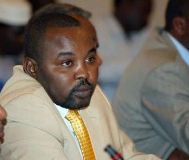Darfur SLM leader: Khartoum must stop civilians killing before talks
Dec 3, 2006 (PARIS) — A Darfur rebel leader today said that Sudanese government must stop daily attacks in Darfur as sine qua non condition for talks with Khartoum. He further urged a key role for the UN in the expected negotiations to end Darfur crisis.
 Abdelwahid Mohamed al-Nur, the leader of the Sudan liberation Movement, told Sudan Tribune on Sunday that to resume talks with Khartoum in order to find out a lasting peace in Darfur, Sudanese government should stop the daily killing of civilians practiced by the Sudanese army and its militias in the region.
Abdelwahid Mohamed al-Nur, the leader of the Sudan liberation Movement, told Sudan Tribune on Sunday that to resume talks with Khartoum in order to find out a lasting peace in Darfur, Sudanese government should stop the daily killing of civilians practiced by the Sudanese army and its militias in the region.
According to al-Nur, the deployment of the international troops must be effective in the region before the held of talks.
“The decision of the last AU Security and Peace Council held in Abuja on the additional AU peacekeeping troops would not restore security in the region” SLM leader said. “It is not a question of number but a question of mandate. We need a force enabled to protect civilians;” he added.
The AU force mandate is to monitor a ceasefire agreement signed in 2004 between the government and the two main rebel groups at that time: SLM/A and JEM.
“The AU force’s mandate needs to be beefed up so that it can be allowed to go after the militias that kill civilians rather than just monitor a failing ceasefire.”
The AU envoy for Darfur, Salim Ahmed Salim, urged Saturday 2 December all the parties to declare a complete cessation of hostilities. Salim said the agreed extension of the AU forces with the UN support will enable the AU force to accomplish its mission as it stipulated in the DPA.
A recent U.N. report says security had markedly worsened in Darfur and that civilians were bearing the brunt of the fighting. Throughout the vast, arid region of western Sudan, banditry continues unabated and humanitarian workers are being targeted, the report also said.
The U.N. worried about increased violence within refugee camps, where more weapons are circulating. Intimidation of refugees and gender-based violence, such as rape and harassment, are regularly being reported, the U.N. said.
LARGE UN ROLE IN THE MEDIATION
Al-Nur Also called for a large role of the United Nations in the talks. He further criticized vehemently the AU top mediator role during the talks saying he hindered the negotiations and employed so called “advisors” who know nothing about the true nature of the conflict.
The rebel leader said he had submitted a supplementary document to the mediator on 5 May to resolve the pending issues in the talks but instead the AU official rejected the last-minutes proposal preferring to exert pressure on the rebel delegations.
“And now, six moths later, they came to say they will discuss a supplementary document with us on our demands”.
“Credibility lost, is not easily regained” he added.
In this context, al-Nur has rejected totally the participation of the new rebel groups in the talks. He considered it as a manoeuvre to divert the real demands of Darfur people.
He indicated that all the demands of the different rebel groups had already been presented during Abuja talks by the SLM and the Equality and Justice Movement.
“The ideal would be to bring them all on board; but if this is not possible, the second best thing would be that as many as possible should be brought in.” said Salim Ahmed Salim on the different rebels groups participations in the expected talks, Saturday.
Al Nur also requested the AU to stop the Darfur-Darfur Dialogue and Consultation (DDDC), saying they suggested this mechanism as confidence building measure after the signing of a lasting peace; but not before.
MALAKAL FIGHTING
Abdelwahid condemned the Malakal fighting saying what happened there is a flagrant violation of the Comprehensive Peace Agreement. He said in Darfur as well as in southern Sudan, the SAF-baked militias wreck peace and attack innocent civilians. He deplored the killing of civilians in Malakal.
He appealed on the SPLM leadership to unify its efforts with the forces of the New Sudan to produce peacefully a real democratic change in the country.
(ST)
